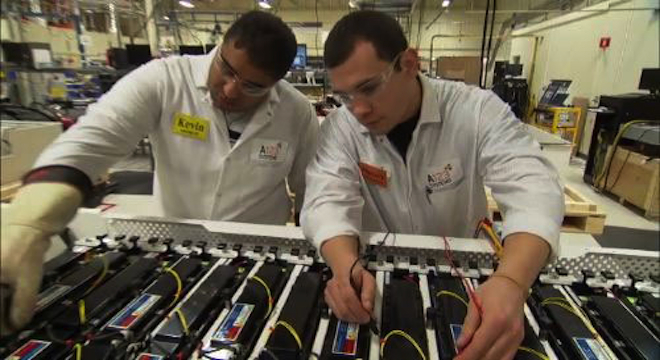Despite unveiling what it says will be a revolutionary new vehicle battery this week, Massachusetts-based firm A123 Systems is fighting skepticism that it will become the “next Solyndra,” a reference to the California solar company that went bankrupt in August 2011 after receiving a $550 million dollar loan guarantee from the U.S. government.
“There are many differences between us and Solyndra,” said Andy Chu, A123’s vice president of marketing and communications, in a phone interview with TPM. “We’re very confident about our future, and we believe we’ll be around for the foreseeable future.”
Indeed, A123 systems is quite distinct from the ill-fated solar manufacturing company that its been compared to lately by many in the media, not least of all because it is involved in a completely different industry: Making advanced lithium-ion batteries for hybrid and electric vehicles using the company’s proprietary material, nanophosphate.
But A123 has suffered a string of major setbacks in the past few months — including an undefined number of defective batteries that had to be recalled to the tune of $67 million, a $125 million quarterly loss to start the year, delays in the construction of a new factory, layoffs and lower-than-expected hybrid and electric vehicle sales.
Add to that the fact that A123 has received a $249 million grant from the Energy Department and has been openly praised by President Obama and Nancy Pelosi (D-CA), it’s no wonder that the company’s announcement Tuesday of a new battery it says it is its best yet was met with some skepticism from the press and right-leaning advocacy groups.
“We did have a few manufacturing issues that cost more than we expected to spend,” Chu told TPM. “We’re adjusting our fundraising to account for that.”
Specifically, Chu said that A123 was looking to raise more capital, despite already being a public company that’s seen its stock tank from its IPO price of $19.60 to around $1.00, a proposition that was again greeted with skepticism by auto industry analysts.
Still, the company is confident that its new battery technology, Nanophosphate EXT, will set it on the right track.
“We think that this technology will be a very significant part of new vehicles going forward,” said Chu.
Nanophoshate EXT seeks to improve on the lithium-ion batteries that currently power most hybrid and full electric vehicles by being able to operate at extremely hot or cold temperatures without the need for a separate temperature control system.
A123 says the technology is expected to produce a “20 percent increase in power” of vehicle batteries at cold temperatures compared to the current industry standard, as well as maintain its life-cycle of 2,000 full-charge discharges at 113 degrees fahrenheit. The company released the following chart showing how its new battery performs against unnamed competitors. The chart shows the discharge capacity, or battery life, over the number of complete charge-discharge cycles.

Currently, Chu said, most lithium-ion vehicle batteries struggle to maintain a balance of providing reliable performance at cold temperatures and battery life at high-temperatures. So if Nanophosphate EXT performs as planned, it would be a huge boon for the industry. But that’s a big “if.”
Chu pointed to the fact that A123 had its new battery tech tested by an independent third-party, Ohio State University, and to analyst projections that the micro hyrbid car market would reach 39 million vehicles by 2017.
Reassuringly for A123 and its investors, the company’s high-profile clients — GM, which is counting on the company to provide the batteries for its forthcoming all-electric Chevrolet Spark, and Fisker, which suffered major embarrassment when its A123-powered Karma died during a Consumer Reports test in March — are hanging on.
“We continue to have very good relationships with Fisker, GM, and all of our other customers,” said Chu. “GM is actually getting very good results with the road tests its conducting on the Chevy Spark right now.”
GM did not respond to TPM in time for publication of this article.
Investors, too, appear optimistic about A123’s plans going forward, at least for now: The company’s stock rose to a 3-month high on Tuesday, following the announcement, though they closed down 13 percent on Wednesday.






